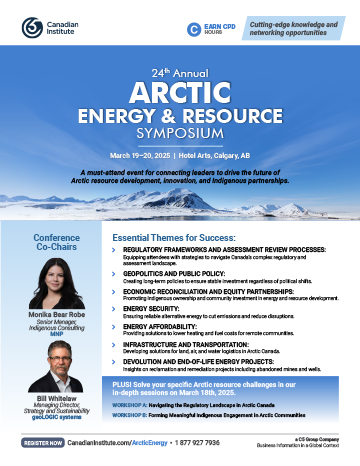Agenda

Flip through our conference brochure and discover what’s new this year.
Download Brochure
Pre-Conference Workshops
March 18, 2025
Day 1
March 19, 2025
Registration and continental breakfast

Angie BatesVice President, Sector Leader - Infrastructure, Environmental Services CanadaStantec
Infrastructure development in the Yukon and Northwest Territories is an essential economic priority for arctic Canada as resources can become stranded without reliable infrastructure. This need was especially evident in 2024 with a bridge closure in Yukon that led to significant project delays and water depths in Mackenzie River being too shallow for barges to transport goods to the region.
The McKenzie Valley Highway project proposal offers promise but with a final construction decision not anticipated until late 2027/early 2028 is time running out on the potential to create nation building infrastructure projects?

Kay-Lee EckhardIndigenous Relations LiaisonCanada West Land

Monika Bear RobeSenior Manager, Indigenous ConsultingMNP

Mellisa MercrediSenior Advisor, Regional Economic DevelopmentRio Tinto

Greg HopfOwner/OperatorMoccasin Trails Inc
A new wave of Indigenous project ownership is helping to catalyze economic development in Canada’s arctic. However, the definition of a successful partnership can vary based on the unique goals and objectives of each partnership. Topics of discussion will include:
- Identifying the critical elements of effective partnerships
- Forming partnerships that are mutually beneficial and sustainable
- Highlighting success stories and the challenges that were overcome from Indigenous equity-owned projects
- Collaborating effectively with Indigenous groups to align goals and build trust
Coffee and Networking Break

Katie KachurVice-President, Government Relations, WestCanadian Propane Association

Jeff KrehmerChief EngineerBig Time Engineering Corp.

Salah AbouelnagaCapital Program ManagerNTPC – Northwest Territories Power Corporation

Susan R. EatonPresidentSR ECO Consultants Inc.
As Northern Canada seeks to increase its energy security and affordability with a diversified energy mix that is sustainable, accessible, and affordable, renewable energy has gained popularity as governments, industry, and consumers seek alternative energy options equipped to handle their unique energy needs. Topics of discussion will include:
- Assessing the current state of renewables in Canada’s Arctic
- Exploring how renewables can displace diesel and enhance energy security
- Determining which renewable sources are most suitable for Northern Canada’s climate
- Examining innovations in propane, wind, solar, and geothermal heating
- Overcoming barriers to renewable energy implementation in the Arctic
- Identifying funding options available for renewable projects

Hon. Doug SchweitzerCo-FounderUltamarii Ltd.

Bill WhitelawManaging Director, Strategy and SustainabilitygeoLOGIC systems
The labour shortage in Canada’s Arctic is impacting project timelines and growth potential, as the region faces unique challenges in attracting and retaining skilled workers. This panel will explore solutions and strategies for Artic Canada’s unique labour situation. Topics of discussion will include:
- Attracting and retaining potential employees in the Arctic region
- Understanding how technology may help address the labour shortages and build capacity
- Promoting knowledge transfer and retraining senior leaders
- Exploring the potential application of artificial intelligence and other technologies in filling workforce gaps
- Examining Indigenous employment opportunities and training programs

Darrell BeaulieuChief Executive OfficerDenendeh Group of Companies
Nations within the Arctic Circle face unique challenges, from extreme weather to high import reliance, affordability concerns, and dispersed populations across vast regions. What innovative solutions can northern Canada learn from—and contribute to—its Arctic neighbors? Topics to be addressed will include:
- Exploring trade opportunities between Arctic countries
- Comparing how northern Canada and Alaska are addressing the energy transition in their respective climates
- Identifying strategies to mitigate climate change across Arctic regions
Networking Break and Refreshments
Showcase
ClimaTech Innovations Showcase: Groundbreaking Climate Solutions for a Sustainable Arctic Future

Agata LeszkiewiczeVinci Business Development Lead CanadaWestinghouse Electric Company, Canada

Jeff KrehmerChief EngineerBig Time Engineering Corp.
This showcase competition will provide emerging and innovative climate companies with the ideal platform to showcase their climate innovations and solutions for Northern Canada.
Join this ClimaTech Showcase to find an ideal company to enhance the climate objectives of your next project!

Dr. Heather BrooksSenior Civil/Geotechnical EngineerBGC Engineering Inc.

Jocelyn L. HayleyProfessor, Civil Engineering (Geotechnical)University of Calgary
Climate change is affecting permafrost in Northern Arctic communities at an alarming rate. The challenges are especially widespread across the Arctic, where permafrost thaw is causing rapid changes to the landscapes.
These changes impact buildings, roadways. seasonal travel, and traditional ways of life for northerners. Topics to be discussed will include: Topics to be discussed will include:
- Examining the impact of climate change on permafrost dynamics
- Outlining the complications of permafrost to infrastructure development and exploration
- Assessing the real-life impact of permafrost in remote northern communities
Day 2
March 20, 2025
Registration and continental breakfast

Heather Exner-PirotSenior Fellow and Director of Energy, Natural Resources and EnvironmentThe Macdonald-Laurier Institute

Benjamin ScottWorking ChairpersonTlicho Investment Corporation & Group of Companies
Canada’s Arctic has long possessed the critical minerals and resources to attract investment. However, complex regulatory frameworks, adequate infrastructure, and a complicated relationship with multiple levels of government have made it challenging for Arctic Canada to maximize its export potential and assist Canada with achieving its climate objectives. Topics of discussion will include:
- Examining what needs to happen for Arctic Canada to maximize its economic and export potential to compete on the global stage.
- Addressing key infrastructure challenges and potential solutions
- Strategies for attracting potential investors.
- Defining how to involve Indigenous communities to expedite development.

Shafak SajidInterim Director, EngagementAlberta Indigenous Opportunities Corporation

Emily BatesDeputy Director, Infrastructure and Regional Strategies DivisionNatural Resources Canada
Many prior development projects in Arctic Canada have had short-life spans without commitment to the region long-term and inadequate consultation with Indigenous communities. However, new models of entire Indigenous ownership are becoming more prevalent providing communities with new economic opportunities. Topics of discussion will include:
- Analyzing the gaps that have deterred prior investment
- Defining what policy decisions need to happen to attract longer term investment in the region
- Outlining new funding models like the Canada Growth Fund, Indigenous Loan Guarantee Program, and Canada Infrastructure Bank that may assist with greater investment
- Critical Minerals Infrastructure Fund including parameters for Indigenous-led projects
Coffee and Networking Break
Working Towards Reconciliation Through Mine Remediation: Lessons learned from Yukon’s Faro Mine Remediation Project

Kim RediesCEODena Nezziddi Development Corporation

Geoff KarcherDirector, Faro Mine Remediation ProjectCrown-Indigenous Relations and Northern Affairs Canada

Jeff MackeyDirector General - Contaminated Sites Branch – Northern Affairs OrganizationCrown-Indigenous Relations and Northern Affairs Canada
Contaminated site cleanup is essential to the long-term health of First Nations residents in Canada’s arctic. The Faro Mine was abandoned in 1998 after the project owner declared bankruptcy and extensive remediation efforts have been ongoing since 2009. Topics of discussion will include:
- Providing an overview of CIRNACs contaminated sites remediation program in the North and how projects are being leveraged to benefit local First Nations
- Reviewing how the Faro Mine Remediation Project is being planned and structured to benefit the Ross River Dena Council and Kaska Nations
- Hearing Lessons learned from the Faro Mine and how Dena Nezziddi Development Corporation (DNDC) is leveraging the remediation to benefit Ross River.
- Understanding how DNDC and CIRNAC are looking to the future and toward creating a successful roadmap that could be applied at other sites in the Yukon and Territories

Ben VogelSenior Advisor, Closure ReadinessRio Tinto
One of the largest mining developments in Canada’s North, Diavik Diamond Mine has been operating since 2003. After building a four-turbine wind farm in 2012, it added to its renewable energy portfolio in 2024 with Northern Canada’s largest off-grid solar plant. Topics to be addressed will include:
- An overview of Diavik’s renewable energy portfolio and the unique challenges of planning, building, and operating off-grid in the North
- Operational metrics and assessments of project viability
- Application of renewable energy within a transitional operational landscape from production into responsible closure
Networking luncheon

Colin XanderPresident and FounderPromise for the North

Mark HeyckExecutive DirectorArctic Energy Alliance
Energy and food security have been long-standing issues in Canada’s arctic. However, immense potential exists for this to transform as more Indigenous communities are becoming true project owners, helping to expedite energy sovereignty and lessen the reliance on imported consumable goods. Topics of discussion will include:
- Growing nutrient-dense foods to create healthier, sustainable food options in Arctic communities
- Partnering strategies for communities to collaborate on projects and form multi-nation alliances
- Implementing renewable energy projects to displace diesel and improve energy affordability
Networking Break and Refreshments

Greg HopfOwner/OperatorMoccasin Trails Inc

Susan R. EatonPresidentSR ECO Consultants Inc.
These interactive roundtables offer attendees the chance to dive deep into key topics, gain valuable insights, and exchange ideas with peers. With expert-led discussions, participants will uncover actionable strategies and best practices critical to advancing Arctic projects.
Roundtable #1: Indigenous Partnerships and Collaboration
This roundtable will explore the importance of building strong and collaborative relationships with First Nations communities in energy and resource development. Experts will share their insights on the cultural, social, and economic factors that influence the perspectives of First Nations communities on energy and resource development, and strategies for building effective partnerships and collaborative relationships with First Nations communities.
Roundtable #2: Renewable Energy Sources that Work in Canada’s Arctic
This roundtable will explore renewable energy sources that are ideal for Canada’s arctic temperatures and environment. Experts will share success stories and challenges of renewable energy sources and what needs to happen for more renewable energy to get to scale in Canada’s arctic.

G. Kent FellowsGraduate Programs Director, School of Public PolicyUniversity of Calgary

Rob HuebertInterim Director, Faculty of Arts, Centre for Military, Security and Strategic StudiesUniversity of Calgary

Dale SwampyPresidentNational Coalition of Chiefs

Amber RuddyVice PresidentCounsel Public Affairs Inc
As Canada navigates new geopolitical realities with U.S. tariffs on Canadian exports, provinces are bracing for the economic impact. Expediting energy and infrastructure projects and revisiting previously cancelled projects like Energy East and Northern Gateway are being reexamined as Canada seeks alternative markets outside of the U.S. Topics of discussion will include:
- Examining the fiscal implications of tariffs on imports and exports in Arctic Canada
- Discussing export potential to markets outside of the United States
- Debating how a change in federal government may prioritize fiscal policy over carbon policy

